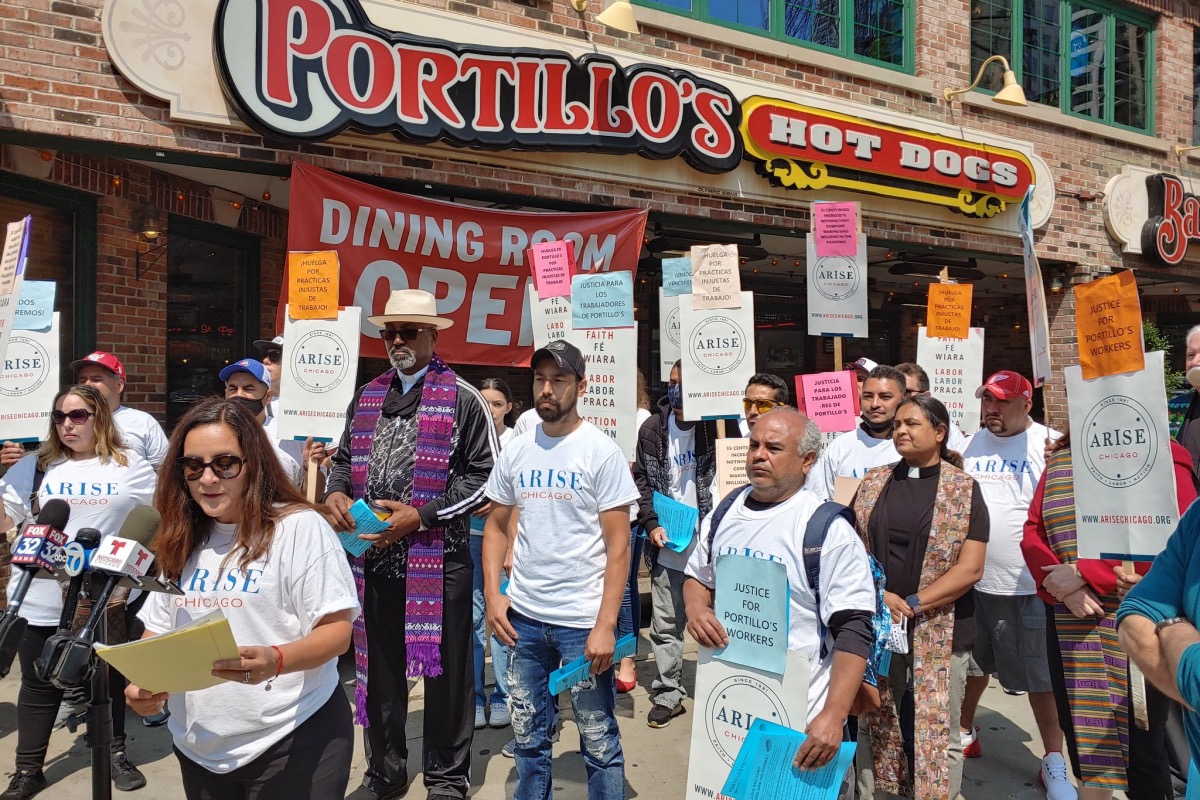

Striking workers from Portillo’s Food Service in Addison, Illinois, hold a press conference, July 2, 2021. (Arise Chicago/Twitter)
By Sonja Diaz and Yanira Merino
Even as the nation continues to grapple with the Delta variant amid an ongoing COVID pandemic, economic recovery is underway and new research from the UCLA Latino Policy and Politics Initiative indicates that unionized jobs must pave the path forward to ensure that workers have the stability and economic resilience needed to withstand future crises.
According to the new findings, Latinos in non-union jobs were seven times more likely than their unionized peers to lose their jobs and wages as a result of the early economic fallout from COVID-19. While union jobs protected workers of all races and ethnicities, the benefit was more pronounced for Latinos. The report also found that Black and Latino workers in union jobs earned better wages, even if it was still lower than their white counterparts.
The union difference is even more paramount for Latina women, who suffer not only from the racial and ethnic pay gap but also from the gender pay gap. In fact, Latina workers are the group most adversely affected by these pay disparities, earning only an average of 57 cents to every dollar earned by white, non-Hispanic men. Unions help alleviate this gap by helping Latinas access non-discriminatory, collectively bargained contracts.
The benefits of unionization make it clear that economic recovery is not complete if workers aren’t given the opportunity to organize and demand better conditions, particularly given how essential many low-income service workers are to the economy.
One of the immediate solutions is to pass the Protecting the Right to Organize Act of 2021, a bill that would make it harder for employers to obstruct organizing efforts. The legislation is currently awaiting action in the U.S. Senate.
The U.S. Bureau of Labor Statistics projected that by 2020 Latinos would represent almost 17 percent of the nation’s workforce. Despite the many benefits of unionized labor, less than 10 percent of Latinos are in union jobs.
As we see in the effort to protect Amazon warehouse workers and other high-profile worker-rights efforts, the benefits of unionization can be as basic as access to paid sick leave during a global pandemic and as significant as letting workers share in the economic prosperity they produce.
Throughout the pandemic, unionized labor has also been a critical safeguard for frontline workers. Research finds that unionized Latinos are 26 percent more likely to have employer-provided health insurance and that unions are essential in advocating for workplace protections such as mask mandates and access to personal protective equipment.
As workers across the nation face legal challenges in their efforts to organize, it’s clear they need legislative support. In 27 states, right-to-work laws require employees to opt into union membership, preventing unions from automatically collecting fees from all represented workers. This results in weaker unions with fewer resources and members. In the agricultural sector —an overwhelmingly Latino industry where less than one percent of workers are unionized— a recent Supreme Court decision bars labor organizers from entering private farms to speak with and recruit agricultural workers.
The pandemic made it clear that if the nation truly values the essential role that workers play, we must make it easy for people to organize their workplaces and demand better conditions. As a critical part of the economic fabric of this nation, Latino workers will be great beneficiaries of more unionized jobs. This is particularly important in the face of an aging white demographic that will depend on the economic might and labor power of America’s youthful and diverse Latino communities. Recovery plans can only ensure stability for the Latino workforce in future moments of economic uncertainty by expanding access to union jobs and benefits they provide.
***
Sonja Diaz is the founding director of the UCLA Latino Policy and Politics Initiative, a research think tank. Twitter: @SonjaFrancine
Yanira Merino is president of the Labor Council for Latin American Advancement, the leading national organization for Latino(a) workers and their families. Twitter: @LCLAA


